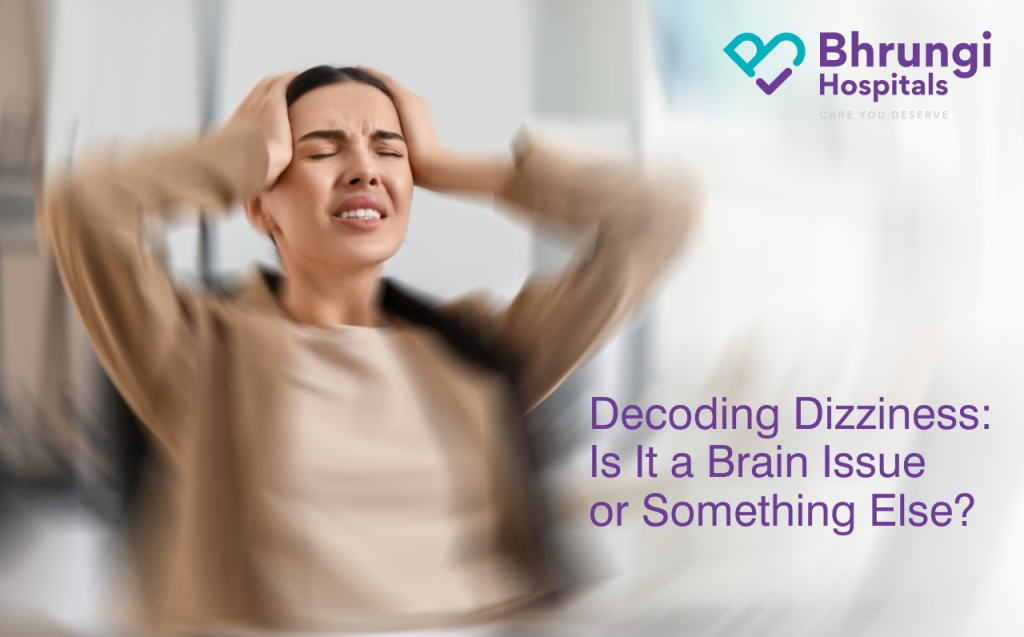That unsettling sensation of spinning, swaying, or feeling completely off-kilter – Dizziness, is a common complaint that can significantly impact daily life. Though quite a common symptom, it often leaves people confused, concerned, and even anxious. When it strikes, the immediate question often swirling in our minds is: ” Is it a fleeting feeling or a sign of something serious?” While the brain is undeniably the command center for our sense of balance, the reality is that dizziness frequently originates from a variety of other sources. Understanding the causes of dizziness is key to finding the right treatment and peace of mind.

What is Dizziness?
Dizziness is a broad term that people use to describe sensations like feeling faint, woozy, unsteady, or as if the surroundings are spinning (known as vertigo). It’s not a diagnosis but a symptom with a wide range of potential causes.
When the Brain Might Be Involved

The brain plays a central role in maintaining balance. If something interferes with its functioning, dizziness may follow. Some neurological causes of dizziness include:
- Stroke or Transient Ischaemic Attack (TIA): A sudden loss of blood flow to the brain can result in dizziness, especially when accompanied by slurred speech, vision changes, or weakness.
- Multiple Sclerosis (MS): This autoimmune condition can affect nerves in the brain and spinal cord, leading to imbalance and vertigo.
- Migraines: Vestibular migraines don’t always cause headaches but can trigger episodes of vertigo or disorientation.
- Brain Tumours or Infections: Although rare, these can exert pressure on areas of the brain involved in coordination and balance.
In these cases, dizziness is often accompanied by other neurological symptoms — double vision, difficulty walking, or confusion — and requires prompt medical attention.

Is It an Inner Ear Problem?

Interestingly, many cases of dizziness have nothing to do with the brain directly. The inner ear — part of the vestibular system — is vital for maintaining balance. Common ear-related causes include:
- Benign Paroxysmal Positional Vertigo (BPPV): This occurs when tiny crystals in the inner ear become dislodged. It causes brief but intense spinning sensations triggered by head movements.
- Labyrinthitis or Vestibular Neuritis: Viral infections can inflame parts of the inner ear or the nerve connecting it to the brain, leading to sudden, severe dizziness.
- Meniere’s Disease: Characterised by episodes of vertigo, ringing in the ears (tinnitus), and hearing loss, this chronic condition affects the inner ear’s fluid balance.
Ear-related dizziness often comes with nausea, ear pressure, or hearing changes and can be evaluated by an ENT specialist or neurologist.
Other Possible Causes
- Low Blood Pressure: Standing up too quickly can cause a drop in blood pressure, leading to light-headedness.

- Dehydration or Anaemia: Reduced blood volume or low haemoglobin can deprive the brain of oxygen.

- Anxiety or Panic Attacks: Psychological stress can manifest physically, including sensations of dizziness or unsteadiness.
- Medication Side Effects: Some drugs — especially those for blood pressure, pain, or anxiety — may cause dizziness as a side effect.

When to Seek Professional Guidance
If dizziness is persistent, recurrent, or accompanied by other symptoms like fainting, vision changes, or chest pain, seek medical advice. Accurate diagnosis often requires a detailed history, physical exam, and sometimes imaging or balance tests.
Paying Attention to the Clues
To help understand the potential cause of your dizziness, consider these factors:
- Type of Dizziness: Is it a spinning sensation (vertigo), a feeling of light-headedness or faintness, or a sense of imbalance?
- Accompanying Symptoms: Are you experiencing nausea, vomiting, headache, hearing loss, tinnitus, blurred vision, weakness, or numbness?
- Duration and Triggers: Is the dizziness brief and triggered by specific movements, or is it constant and seemingly random?
Final Thoughts
Dizziness is a complex symptom with many potential causes — some benign, others more serious. Understanding whether it stems from the brain, inner ear, or another system altogether is the first step toward relief. Don’t ignore it or self-diagnose. A thorough medical evaluation can help you decode the dizziness and find your balance again.
Bhrungi Hospital- Providing you Comprehensive and Coordinated Care That You Deserve
With a focus on holistic recovery, Bhrungi Hospital stands as a leader in high-quality emergency and critical care services in a patient-centered setting. Our integrated approach combines expertise, advanced technology, and compassionate care, focusing on safety and transparency while remaining affordable and accessible to all patients in need.
- ACLS Ambulance with free service within 10KMs radius
- Ventilator Ambulance service available
- Call +91 7845 108 108 anytime, any day
- 100+Beds Multispecialty Hospital
- 24×7 Emergency Care






